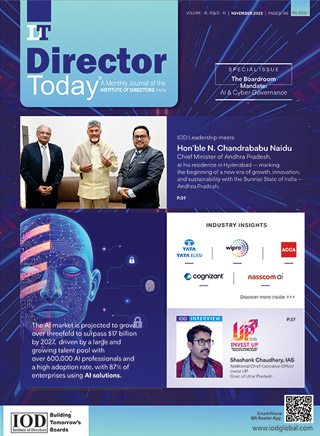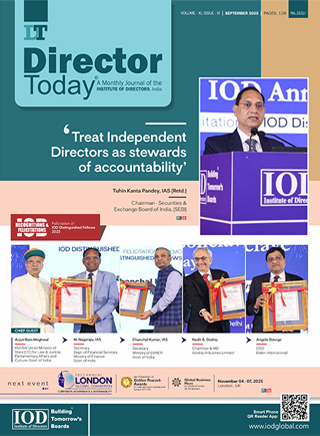Corporate Governance in Chile

How Chilean Boards are leading in an Age of Transformation
Insights from the Instituto de Directores de Chile (IdDC)
In recent years, Chilean boards have faced an unprecedented transformation. Technological changes, social expectations, and the growing complexities of the business environment have created a new reality that demands a proactive and strategic response from organizations. Globalization, the quick implementation of emerging technologies, and the increasing concern for sustainability and ESG factors are reshaping corporate governance and forcing boards to rethink their approach.
The current business environment, marked by volatility, uncertainty, and complexity, requires boards not only to respond to immediate pressures but also to anticipate and plan for the future. Global economic crises, regulatory changes, and evolving consumer expectations demand that companies rethink their business models and ways of operating. In this context, the role of the board has expanded far beyond mere financial oversight. Today, directors must lead with strategic vision, integrating emerging technologies, managing risks, and seizing opportunities to ensure the long-term success of the companies they direct.
The Chilean Institute of Directors (IdDC), in its study "Trends in Boards 2024," surveyed 240 board members from diverse industries, uncovering the key trends and priorities that will shape the future of corporate governance in Chile. The report highlights that, Chilean boards are living a critical moment of transformation, facing challenges and opportunities that are redefining corporate governance. Confidence in their ability to take on these new responsibilities is high, but long-term success will depend on their capacity to continue developing key competencies such as technological risk management, the implementation of sustainable policies, and adaptation to an ever-evolving regulatory environment.
The need to adapt to digital transformation, manage cybersecurity, and balance innovation with regulation, are just some of the issues that now are dominating the agendas of Chilean boards.
Chilean boards are living a critical moment of transformation, facing challenges and opportunities that are redefining corporate governance.
Challenges for Directors
According to the study, directors face three key areas on their agenda: the management of new technologies and Data Science (48.3%), which reflects the growing role of technology in decision-making; strategic vision (41.3%), essential for anticipating changes in the current business environment; and diversity in professions, gender, and background (31.7%), which emphasizing the need for more inclusive leadership.
These challenges have driven an evolution in directors, requiring them to take on new and greater responsibilities. In fact, 95% of the directors surveyed agree that their role has changed in the last five years, mainly due to changes in Chilean regulations, which have increased criminal penalties for high executives and board members.
On the other hand, one of the main risks to business performance is the lack of social cohesion and political polarization that the country is facing, as well as the proliferation of criminal economies or illicit activities, followed by the increasing number of cyberattacks and cybersecurity risks.
Impact on the board's agenda
Cybersecurity, generative AI, and the balance between innovation and regulation (62.1%, 46.7%, and 43.3%, respectively) are now central subjects in the board agendas. These technological challenges require strategic vision, technical skills, and resilience to manage them effectively.
In response to these challenges, boards are prioritizing the recruitment of experts in regulation and public policy (22.9%), followed by financial professionals (22%) and Data Science specialists (19.5%), key skills to tackle current risks and ensure proactive, agile leadership.
Despite the current challenges and risks, the effectiveness of boards is evaluated positively. A solid 72.4% of respondents gave good ratings, reinforcing the perception that boards are fulfilling their responsibilities effectively and performing well. However, it is essential for boards to continue evolving to anticipate future challenges and changes.
“In the context of accelerates changes, boards in Chile have the responsibility to lead with proactivity and transformative vision. At the Instituto de Directores de Chile (IdDC), we promote corporate governance that not only addresses current challenges but also prepares for the future. The results of out study reinforce that, while the path is challenging, director are well-positioned to guide companies towards a more sustainable and successful future”, says Fadua Gajardo, Executive Director of the IdDC.
In summary, Chilean boards are at a crucial moment, facing series of challenges and opportunities that are redefining corporate governance in the country. The need to adapt to digital transformation, manage cybersecurity, and balance innovation with regulation, are just some of the issues that now are dominating their agendas. Additionally, there is a growing demand for transparency, diversity, and social responsibility, which is also shaping the future of business management.
In line with this, the results of the study conducted by the Chilean Institute of Directors (IdDC) reflect a positive assessment of boards in the country. The 72.4% favorable ratings reflect the confidence that directors are successfully taking on their new roles. However, to maintain this favorable trend, it will be essential to continue developing the necessary competencies to address these challenges and strengthen strategic leadership, ensuring companies are well-prepared for long-term success and sustainability.
Author

Institute of Directors India
Bringing a Silent Revolution through the Boardroom
Institute of Directors (IOD) is an apex national association of Corporate Directors under the India's 'Societies Registration Act XXI of 1860'. Currently it is associated with over 31,000 senior executives from Govt, PSU and Private organizations of India and abroad.
Owned by: Institute of Directors, India
Disclaimer: The opinions expressed in the articles/ stories are the personal opinions of the author. IOD/ Editor is not responsible for the accuracy, completeness, suitability, or validity of any information in those articles. The information, facts or opinions expressed in the articles/ speeches do not reflect the views of IOD/ Editor and IOD/ Editor does not assume any responsibility or liability for the same.

 Quick Links
Quick Links
 Connect us
Connect us




 Back to Home
Back to Home






























